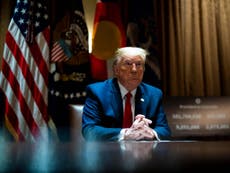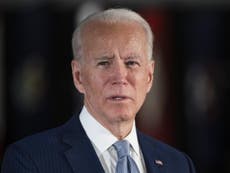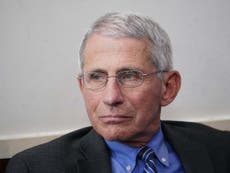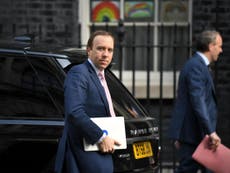Weijia Jiang asked a question that left Trump unable to respond. So let's talk about what the answer actually is
We know the president stormed out of the briefing room — but we also know Asian American women are often silenced, and it's time to listen to what Jiang was saying
I don’t often write about being Asian American.
Microaggressions, systemic inequality and racism in all of their complexity cannot be summed up here. My personal feelings about being a light-skinned East Asian American woman with relative privilege — albeit forced to live in a relative state of quiet — cannot be summed up here. But my reaction to the brief exchange between Donald Trump and Weijia Jiang can.
I am a graduate journalism student and am already wary of ethics discussions that center on the experiences of white reporters. Pushback is something I expect, and I ready myself by reading the work of women of color. It’s a quiet solidarity exercise, just for me, alone in my mind.
And, honestly, responses by Trump, known for evasion and inaccuracy, do not usually elicit any emotional response. But this time, Jiang’s unanswered question — and the use of racism to quiet her — left me uneasy.
On Monday, Donald Trump held a briefing in the White House Rose Garden, pushing the erroneous claim that Covid-19 tests are available to anyone who wants to get tested. In front of a banner that stated, boldly, that “AMERICA LEADS THE WORLD IN TESTING”, he grew agitated as reporters asked questions.
(In quick response to the banner: according to Our World Data, when controlling for a country’s population, the United States does not lead the world in testing. It is in fact way behind a host of countries including Denmark, Italy and New Zealand.)
Reporters continued to challenge the statement that testing is available to any American. Trump responded, "It is a true statement already. We have more testing than anyone by far," repeatedly reducing pandemic response to global competition.
CBS News White House Correspondent Weijia Jiang pointed this out by asking: "Why is this a global competition to you when Americans are losing their lives every day?"
Trump responded, "Maybe that's a question you should ask China."
Jiang, a Chinese-born Asian American, asked, "Why are you saying that to me, specifically?"
Trump said, "I'm saying it to anybody who would ask a nasty question like that." He then declined CNN correspondent Kaitlan Collins' question and walked out of the Rose Garden. And, like many questions since the start of his presidency, Jiang's went unanswered.
Trump's avoidance diminishes any critical response to his statements, which is a necessary function of journalism. Throughout the pandemic, he has failed to address how the United States’ delayed testing led to widespread and prolonged stay-at-home orders or why there was a lack of resources in hospitals. Investigative reporters assessed the systemic problems in our government, hospitals, and other institutions. White House correspondents scrutinized false statements, rigorously questioning an administration that shares inaccuracies with the world. For more than three years, reporters have slogged through muddled “truth,” investigating, re-examining, and in many cases debunking it.
This time, the president attempted to silence an Asian American reporter with a very valid question. Whether the United States has more tests than other countries does not address whether the tests are accurate or readily available, or whether those tests are doing anything useful in terms of helping us exit quarantine and continue to navigate this new normal. So, let’s talk about Jiang's question, which interrogated Trump’s measure of testing success, a necessary prerequisite to reopening the economy. This is a point that is especially important now as protests erupt across rural America.
"Quarantine is for sick people; you lock sick people away," Eric Moutsos told NPR recently. Moustos helped create a Facebook group called Utah Business Revival that held a protest to "reopen the economy" on April 18 in Salt Lake City.
The protests are ill-advised, when considering the recommendations from the CDC and healthcare experts, as is the suggestion to reopen the economy right now. However, Moustos’ point touches on two important anxieties in our current time: Firstly, when the economy closes and there are little to no options for the general public, who need to pay bills and rent — when the choice is between financial devastation or life-threatening sickness — what is an everyday American supposed to do? Secondly, how do you know if you’re sick if you cannot access an antigen test for a current infection, and how do you know you were sick with coronavirus if the other tests — the antibody tests — aren’t sufficiently reliable?
Health officials have cited antibody tests in particular as a tool to reopen the economy. However, it is possible to get a false positive even when taking an effective antibody test. And the prevalence of false positives is more likely when only a small portion of the population has had the virus. This could result in people re-entering the workforce with false positives, contributing to viral spread. FDA regulations have been relaxed during the pandemic in order to allow antibody tests to get out on the market faster — but that loosening of regulations comes at a price, and inevitably means that some barely effective tests will make it through. Some could even be being used on people desperate to know whether the illness they had a few weeks ago was Covid-19 right now.
It’s worth bearing in mind that the World Health Organization has also said “there is currently no evidence that people who have recovered from Covid-19 and have antibodies are protected from a second infection.” So, without this definitive information, those who were once sick and recovered could be reinfected. Scientists think those who had a more severe infection might give longer immunity, but the truth is that this is an unprecedented situation and no one has any definitive idea.
On Tuesday, leaders of the Trump administration’s coronavirus response told a Senate panel that the US did not have the capacity to control a spike in cases if the nation prematurely opened the economy. Dr Anthony Fauci warned that states coming out of lockdown could see a very grim reality within weeks. We know people — especially young people — can be asymptomatic carriers of Covid-19, which is why antigen tests are as important as antibody tests to help control and mitigate such a spike. Unfortunately, it’s still unclear whether those tests are available and accessible in the numbers they will need to be.
A third-year resident at Jamaica Hospital Medical Center in Queens, New York told me in March that he started calling colleagues on his days off. The Covid-19 pandemic brought the residents closer together as they worked long hours. Together, they carefully estimated the number of remaining ventilators and worried about saying too much on social media. After three residents got sick with suspected cases of the virus, administrators chastised residents who posted online about what was happening inside the hospital. In response, the close-knit group moved to a private Facebook page, the more seasoned residents offering advice to the newer.
"Every day, you can just literally feel it getting worse and worse," said the resident. "The whole hospital is now almost a Covid hospital."
As the months passed, overcrowded hospitals and makeshift intensive care units became the norm in New York City hospitals while Covid-19 cases steadily rose. It is the hope that another spike in cases is prevented, though one could soon be coming for states that abandon social distancing — and a spike in those states will inevitably lead to another in a well-connected, densely populated city like New York.
Journalists like Weijia Jiang, who interrogate faulty measures of success and misinformation, play an important role in response and prevention by challenging inaccuracies that spread all too quickly. The more we allow them to be silenced, the more we put ourselves at risk.







Join our commenting forum
Join thought-provoking conversations, follow other Independent readers and see their replies